Star Trek (TOS)
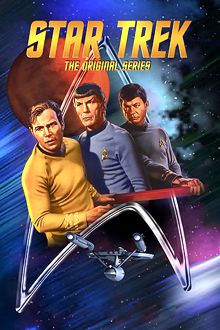 1966-1969, Desilu
Productions/Paramount Television
1966-1969, Desilu
Productions/Paramount Television
Having literally grown up on the original Star Trek, it holds a special place in my TV show heart, warts and all. Yes, the acting was hammy and over-the-top. The sets and effects were laughably bad. Some of the "messages" were beat-you-over-the-head obvious. But for me, the pros outweighed the cons. Whereas nearly every other science fiction television series was (and, surprisingly, remains) doom-and-gloom, with lame monsters-of-the-week and frustrating back-where-we-started plots, Trek was, more often than not, optimistic, uplifting and forward-looking.
Trek regularly tackled issues of its day, and while that makes some episodes painfully dated, others are surprisingly prescient, with messages that are easily transposed onto current-day topics. It was daring for its time, particularly with respect to race and gender, yet society seems to believe we've moved past such things; the awful truth is that we haven't. Enlightenment, I fear, may still be generations away, if we don't obliterate ourselves first.
The show had moments of brilliance that transcend the half-century that's passed since its day. This was down to the writers: bold, brave visionaries that the producers wisely tapped. Granted, even the best of Trek's stories were saddled with bad acting and threadbare sets, but those who cannot look past these superficial flaws are to be pitied.
As an aside, being a student of music as well as cinema, I've always considered the score to be well-above-average, particularly for the first two seasons. Thankfully, nearly every minute of original music was released on a limited-edition CD set, which I was lucky enough to obtain. The set features a number of sound effects in addition to music; it was surprising to learn how many sounds were created by the orchestra—the iconic transporter sound, for example, was in fact generated with musical instruments!
Favorite episode: "City on the Edge of Forever" (no doubt no surprise).
Least-favorite episode: There are many, but "And the Children Shall Lead" bubbles to the top of my list.
DKS 12/20/17
GRUMPY OLD FART-O-METER® Rating:

Star Trek: The Next Generation
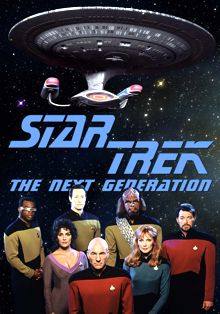 1987-1994, Paramount Television
1987-1994, Paramount Television
Having an enormous soft spot for the original series, plus a deep interest in science fiction in general, it's no wonder that I watched TNG almost religiously. Indeed, it was the reason I got cable TV at a time I began to divorce myself from television. As I watched the series, I built a videotape library (now replaced by disc). And then came the surprise: as I re-watched the episodes, my initial enthusiasm for the series began to wane. Deep down inside, it was hard to shake the feeling that too many of the episodes were... well, just... lame.
Make no mistake, some episodes were truly brilliant. Overall the writing was above-average, occasionally inspired, and at the very least literate; the performances were (with some wince-inducing exceptions) generally superior to those of its predecessor; and the vastly improved production values made the show visually and aesthetically much more palatable. Yet it was hard for me to shake the sense that TNG was relying too heavily on TOS fans to carry it. "Easter eggs" were abundant—sometimes delightful, sometimes eye-rolling, and sometimes disastrous (think "The Naked Now"). In the end, what won the day (more or less) was the series eventually finding its own voice—even if that was after several seasons.
Most episodes suffer from a ponderous, sometimes nearly overwhelming amount of "technobabble," where plot devices hinge on totally improbable—even embarrassing—scientific nonsense. One could almost sense the writers gradually painting themselves into corners, and breaking out thanks only to the chief engineer arriving at miracle solutions, spouting endless variations on scientific buzzwords of the day. While the original series was not immune to this affliction—usually down to Bones divining the "miracle cure of the week"—the strength of the original series was its ability to deliver engrossing drama that was usually independent from science and technology. TNG was also occasionally guilty of TOS's tendency to preach morality tales, but thankfully this was done more subtly and less frequently.
Still, do not mistake my apparently harsh criticism for disdain; I enjoyed—and still enjoy—the series more than I dislike it. I seek out its best moments and revel in them, and do my best to ignore its countless patent flaws (funny forehead alien of the week, anyone?), as any Trek aficionado might. I mean, come on, who doesn't laugh when Worf pauses to break into Klingon opera?
Favorite episode: "The Measure of a Man" (which—true story—turned my Trek-hating girlfriend at the time into a Trek fan; indeed, she was far more upset when the series ended than I was).
Least-favorite episode: There's an alarmingly large number of them, and my choice may be different according to my mood and the phase of the moon. Although I'm tempted to say it's any episode with Wesley, and feel confident there'd be many nodding heads out there, my current least-favorite is "Shades of Gray," a lame, all-too-obvious budget-saver full of flashbacks from earlier episodes.
DKS 12/20/17
GRUMPY OLD FART-O-METER® Rating:

Star Trek: Deep Space Nine
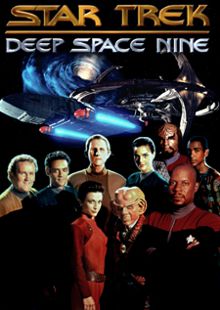 1993-1999, Paramount Television
1993-1999, Paramount Television
Deep Space Nine has the distinction of being one of the first in the Trek franchise series to escape one of Roddenberry's prime directives, which all but starved the shows he controlled of a sorely needed dramatic element: internal conflict. He decreed that all Federation denizens would always coexist peacefully. Consequently, his stranglehold on TNG forced writers to externalize all conflict, which arguably hobbled them.
Roddenberry's death freed writers from this constraint, and the first expression of their relief was Deep Space Nine. Unfortunately, this freedom was cancelled out by locating the series on a space station, which limited their storytelling ability, reducing it to little more than a space soap opera with TNG's funny forehead aliens of the week.
It's kind of sad, because a space soap opera might have had more potential than what we ultimately got; even soap operas can be engrossing if the writing is good and the characters click. Sadly, we got to watch the series struggle though some all-too-obvious re-tooling across a bafflingly long run of seven seasons. Among their desperate attempts at retaining Trek fans, they eventually added a spaceship to get the main characters off the station, imported characters from TNG, and featured crossover guest villains.
Working against DS9 was an acutely anemic music score, plus yet another child as a main character, this time Jake Sisco (and occasionally his cringe-worthy Ferengi buddy) replacing Wesley of TNG. And speaking of the Ferengi, they alternately provided mildly amusing comic relief and embarrassingly awful idiocy; I honestly can't say if "It's a female!" is either a high or low point. The show was relatively well-liked by Trek fans; sorry, I didn't drink the Kool-Aid.
Update: See the documentary What We Left Behind for a remarkable look at the series.
DKS 12/20/17
Rev 2/22/22
GRUMPY OLD FART-O-METER® Rating:

Star Trek: Voyager
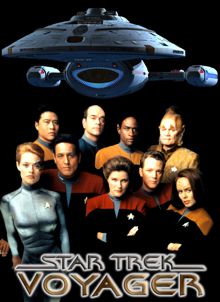 1995-2001, Paramount Television
1995-2001, Paramount Television
It's virtually impossible for me to say anything positive about Voyager; in my mind it marked the nadir of the franchise. Everything about it reeks of being a money-grab by a studio making one too many trips to the Trek well.
(Now, before I continue, I must state emphatically that some of the following remarks are not meant to disparage anyone in any way, particularly women and minorities; they are, instead, observations on how the motives of studios may be perceived. So, please do not flame me.)
Voyager tried to hit too many marks all at once: a female captain evidently to satisfy feminists; a black Vulcan evidently to remain racially balanced; a "space babe" obviously to grab the young male demographic; copious amounts of technobabble to satiate sci-fi geeks; and, of course, all of the trappings of the Trek universe, including the Federation, the Prime Directive, warp drive, funny foreheads, recycled characters from earlier series etcetera, ad nauseam, in an effort to retain franchise loyalists.
Since one cannot be all things to all people, the end result was an embarrassing mess. I'm perpetually baffled by how the series ran so long. It's a shame that some good sets, decent effects and miles of celluloid were wasted on this massive misfire. I mean, come on... being "everywhere" at Warp 10? Oh, puh-LEEZE!
Perhaps an indication of my disdain for Voyager: I've yet to make it through all seven dismal seasons, and I don't know that I have the strength of will to continue. There would have to be some awesome episodes I haven't seen to raise the score.
Trivia: See Coma for a proto-Janeway.
DKS 12/20/17
GRUMPY OLD FART-O-METER® Rating:

Star Trek: Enterprise
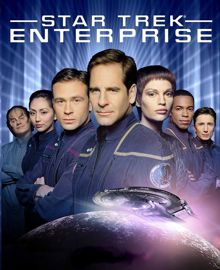 2001-2005, Paramount Television et al
2001-2005, Paramount Television et al
Among those who know me, it comes as no surprise that I often buck popular trends. Case in point is Star Trek: Enterprise, which was poorly received by many hardcore Trek fans, yet earns high marks from me. Yes, it's not without its flaws—what television program isn't?—but I believe it got much more right than wrong.
Arguably one of its bigger liabilities was the decision to cast Jolene Blalock as a sexy female Vulcan (huh?) in a painfully obvious bid to reel in sex-starved male teen geeks. In a casting misfire of a different sort, Scott Bakula is unconvincing as a supposedly proto-Kirk captain. And the series suffered a very shaky start, taking more than a season and a half to find its footing.
Those nits aside, its prequel setting to TOS offered a number of unique, drama-rich advantages: freedom from the almost smothering Prime Directive, the miraculous plot-saving transporter, and a host of other trappings created by Trek canon. The series' most powerful episodes present fascinating ethical conundrums that lasers and logic are ill-equipped to resolve, in a manner that surely would have made Roddenberry proud.
Consider: in the UK, Enterprise is the most popular series of the entire franchise; I think they know something that state-side fans don't. I'm genuinely sad that it only survived four seasons—although, while it comes as little consolation, this may not have been the fault of the series itself, as it evidently fell victim to studio politics as well as various external forces.
Favorite episode: "Dear Doctor," an impressive dramatic work that sticks with you for days after seeing it.
Least-favorite episode: "In a Mirror, Darkly," the two-parter featuring the original Enterprise, which may come as a surprise to some readers since it's a "fan favorite." Sorry, I thought it was lame; integrating the original ship was awkward at best, nearly as embarrassing as DS9's cringe-worthy send-up to TOS's brilliantly light-hearted "The Trouble with Tribbles."
DKS 12/20/17
GRUMPY OLD FART-O-METER® Rating:

Star Trek: Picard
 2020-, Secret Hideout et al
2020-, Secret Hideout et al
Although I honestly didn't see this coming, in retrospect it didn't surprise me. I recall my first reaction to the news was, "Oh brother, another trip to the well. How much are they paying 80-year-old Patrick Stewart to reprise his role?" Then came the genuine surprise: he was enthusiastic about it, to the point that he became an executive producer, and also had considerable input on its development.
The advance reports and early screenings were hopeful-sounding, but given it was only available through a paid cable subscription, I never expected to be able to see it. Then it suddenly appeared on DVD, and I thought, "Oh, hell yeah."
Picard is solidly produced, lovingly written, and competently performed. But... (and you knew there'd be one) there were some elements that clashed with the show's more "adult" tone. Case in point: Santiago Cabrera as Captain Cristóbal Rios, a cigar-chomping, scenery-chewing, larger-than-life, in-your-face Rogue, with a Great Big Capital R. Worse, thanks to an over-active hologram generator, there's a total of six Rios, each more silly and over-the-top than the last. One particularly painful scene features all five holographic Rios at once. Another serious flaw was the the way the season wrapped up: entirely too predictably. Once we arrive at the synth homeworld, the story progression became evident well in advance of its telling. Plus, the very final scene, which formally brings our motley crew together for a good old classic Picard "Engage" was, well, Corny, with a Great Big Capital C.
To the series' credit, I appreciated how the season started, with story elements unfolding at a studied pace—something with which many critics took issue, and something I wished they'd maintained, especially considering how it gave Stewart's controlled, understated (for him) portrayal of a broken, humbled man room to breathe. I was also delighted by how they handled the re-introduction of some familiar old faces, such as Riker and Troi, and it was quite enjoyable spending time with them again; indeed, I wouldn't have minded if they'd lingered on screen a bit longer. Kudos, too, for the rebooted Seven of the Rangers (a.k.a. Seven of Nine), a more enjoyable, authentic-feeling rogue than Captain Rios.
Bottom line: despite its flaws, for me Picard more than made up for the abysmal, insulting, slap-in-the-face known as Star Trek: Discovery, which is Trek in name only. How bad was it? It was so bad that I elected not to review it, and I won't even bother watching anything beyond the first season. I actually prefer Voyager—ouch!
DKS 4/11/21
GRUMPY OLD FART-O-METER® Rating:

Star Trek: Strange New Worlds
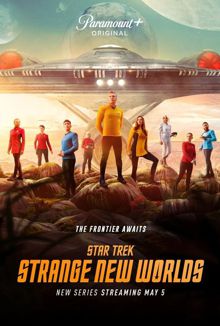 2023-, Paramount Television et al
2023-, Paramount Television et al
Finally, someone figured out how to do it right! It only took, what, seven tries? And they did it without breaking canon, too—most impressive—because these are the voyages of Captain Christopher Pike aboard the U.S.S. Enterprise. Unlike Picard and his talk-you-to-death brethren, Pike isn't afraid to use his fists to solve problems on occasion. Plus, they didn't screw around with the design of the classic, unmistakable starship (much), which was refreshing.
However (and you knew there was one of those coming), the ship interiors... good grief, the bridge has more lights than a set from Tron Legacy, the sick bay is larger and more futuristic than anything from any of the films, and Pike's personal quarters are enormous and far more extravagant than TNG's Ten Forward, complete with a bar and a fireplace—it would make an extraordinary apartment if it didn't have so many bloody lights! Overall, the sets are all so large—the ready room is the size of a shopping mall—that the crew compliment couldn't have been much more than a few dozen, as opposed to over 400; the "Galaxy Class" Enterprise D from TNG seems positively cramped by comparison. Oh, and the Galileo shuttlecraft is the new Tardis: same boxy little thing from the outside as before, but mind-blowingly huge on the inside, with lights covering every freaking square inch.
Anson Mount cuts a fine figure as a proto-Kirk in his gold sweatshirt uniform and that seriously impressive heap o' hair, and Rebecca Romijn makes a convincing Number One. But, regrettably, Ethan Peck doesn't do much of anything for me as Spock—his portrayal is as nuanced as a concrete block, which does the character a disservice—and the whole thread with T'Pring is pretty eye-rolling.
The serial stories range from lightweight to action-packed, the pace is consistent for the most part, and the effects are (as to be expected) extraordinary. Less preachy than TNG, it does venture down Technobabble Lane fairly but not objectionably often. Situations do get a bit soapy around the edges at times—everyone has a Great Big Secret—but, at the end of the day, it's the best Trek since Trek.
DKS 3/22/23
GRUMPY OLD FART-O-METER® Rating:

